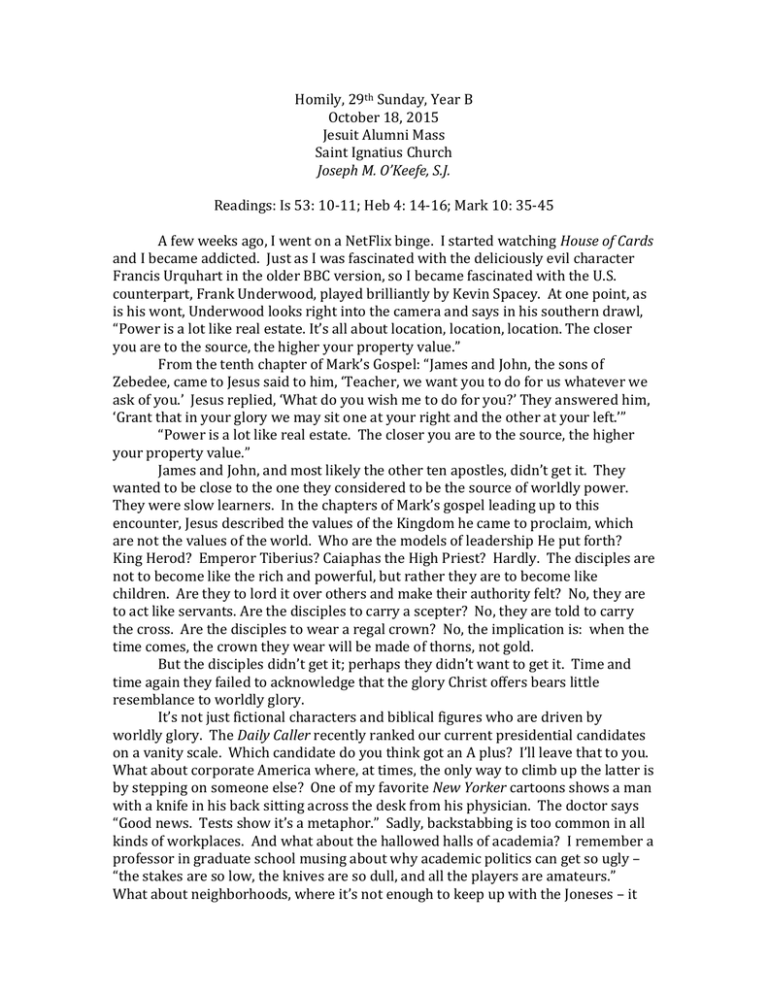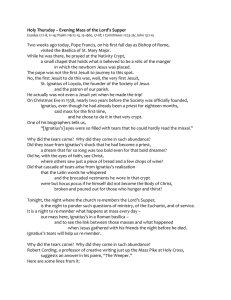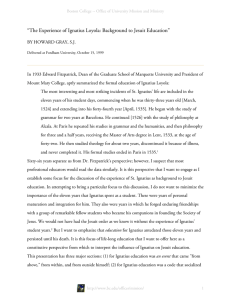Homily, 29 Sunday, Year B October 18, 2015 Jesuit Alumni Mass
advertisement

Homily, 29th Sunday, Year B October 18, 2015 Jesuit Alumni Mass Saint Ignatius Church Joseph M. O’Keefe, S.J. Readings: Is 53: 10-11; Heb 4: 14-16; Mark 10: 35-45 A few weeks ago, I went on a NetFlix binge. I started watching House of Cards and I became addicted. Just as I was fascinated with the deliciously evil character Francis Urquhart in the older BBC version, so I became fascinated with the U.S. counterpart, Frank Underwood, played brilliantly by Kevin Spacey. At one point, as is his wont, Underwood looks right into the camera and says in his southern drawl, “Power is a lot like real estate. It’s all about location, location, location. The closer you are to the source, the higher your property value.” From the tenth chapter of Mark’s Gospel: “James and John, the sons of Zebedee, came to Jesus said to him, ‘Teacher, we want you to do for us whatever we ask of you.’ Jesus replied, ‘What do you wish me to do for you?’ They answered him, ‘Grant that in your glory we may sit one at your right and the other at your left.’” “Power is a lot like real estate. The closer you are to the source, the higher your property value.” James and John, and most likely the other ten apostles, didn’t get it. They wanted to be close to the one they considered to be the source of worldly power. They were slow learners. In the chapters of Mark’s gospel leading up to this encounter, Jesus described the values of the Kingdom he came to proclaim, which are not the values of the world. Who are the models of leadership He put forth? King Herod? Emperor Tiberius? Caiaphas the High Priest? Hardly. The disciples are not to become like the rich and powerful, but rather they are to become like children. Are they to lord it over others and make their authority felt? No, they are to act like servants. Are the disciples to carry a scepter? No, they are told to carry the cross. Are the disciples to wear a regal crown? No, the implication is: when the time comes, the crown they wear will be made of thorns, not gold. But the disciples didn’t get it; perhaps they didn’t want to get it. Time and time again they failed to acknowledge that the glory Christ offers bears little resemblance to worldly glory. It’s not just fictional characters and biblical figures who are driven by worldly glory. The Daily Caller recently ranked our current presidential candidates on a vanity scale. Which candidate do you think got an A plus? I’ll leave that to you. What about corporate America where, at times, the only way to climb up the latter is by stepping on someone else? One of my favorite New Yorker cartoons shows a man with a knife in his back sitting across the desk from his physician. The doctor says “Good news. Tests show it’s a metaphor.” Sadly, backstabbing is too common in all kinds of workplaces. And what about the hallowed halls of academia? I remember a professor in graduate school musing about why academic politics can get so ugly – “the stakes are so low, the knives are so dull, and all the players are amateurs.” What about neighborhoods, where it’s not enough to keep up with the Joneses – it 2 has to be the bigger house, the fancier car, buying into a Kardashian way of life? Even in families we can succumb to the temptation to be the most successful, where it’s not good enough just to be good; it's only good enough to be better than your sibling, your cousin, your mother-in-law. And worst of all, what about the Church? Last year Pope Francis said, “Some of those who follow Jesus do so in search of power. A clear example of this is to be found in John and James, the sons of Zebedee who asked Jesus to seat them in places of honor, one on His right and one on His left in His Kingdom. And in the Church there are climbers, people driven by ambition! There are many of them! But if you like climbing,” the Pope said, “ go to the mountains and climb them: it’s healthier! Do not come to church to climb!” “Do not come to church to climb.” Rather let us come to church to learn anew that we don't have to compete in the rat race, that there is an alternative way to live, the way of the Kingdom. Let us come to church to be drawn out of the shallows into a deeper relationship with God and with others. Let us come to church to ask forgiveness for the selfishness that has led us down paths where, by commission and omission, we have sought to advance ourselves at the expense of others. And in so doing, let us heed these words from the letter to the Hebrews: “We do not have a high priest who is unable to sympathize with our weaknesses, but one who has similarly been tested in every way, yet without sin.” This Sunday we join with Jesuit alumni gathered for mass in four cities of the Northeast Province. As we do so, let us remember the experience of the founders. In the first chapter of his Autobiography, Ignatius acknowledged that, in his youth, he had been driven by a passion for fame and fortune. We know the story. He was injured in battle, and endured horribly painful surgery to maintain his vanity. While recovering he had access to none of the books of courtly romance that he enjoyed reading, only books on the lives of Christ and the saints. Reading them, a conversion process began. Ignatius would come to live not for his own glory, but for the glory of God. Based on what he told us in the Autobiography, he battled the temptation to vainglory his entire life. But because of his intimacy with the Lord, vanity gave way to humility and magnanimity. Likewise Francis Xavier. When Francis met Ignatius in Paris he was a proud, aristocratic, ambitious young man seeking fame and fortune. For three years, Ignatius patiently encouraged him to look at his life differently. The question he posed comes from the eighth chapter of Mark’s gospel. “Francis,” he said, “What profit a man if he gains the whole world and loses his soul in the process?” The question Ignatius posed to Francis nearly five hundred years ago is a question that he would pose to us today: What profit is there to gain the whole world and to lose your soul in the process? What has our Jesuit education taught us? To make a life, not just a living; to serve more than to be served; to forgo self-centeredness to embrace the love that decenters the self; to be men and women who live not for themselves but for God and his Christ - for Christ who lived and died for all the world; men and women with and for others; men and women who cannot even conceive of love of God which does not include love for the least of their neighbors. 2 3 3










